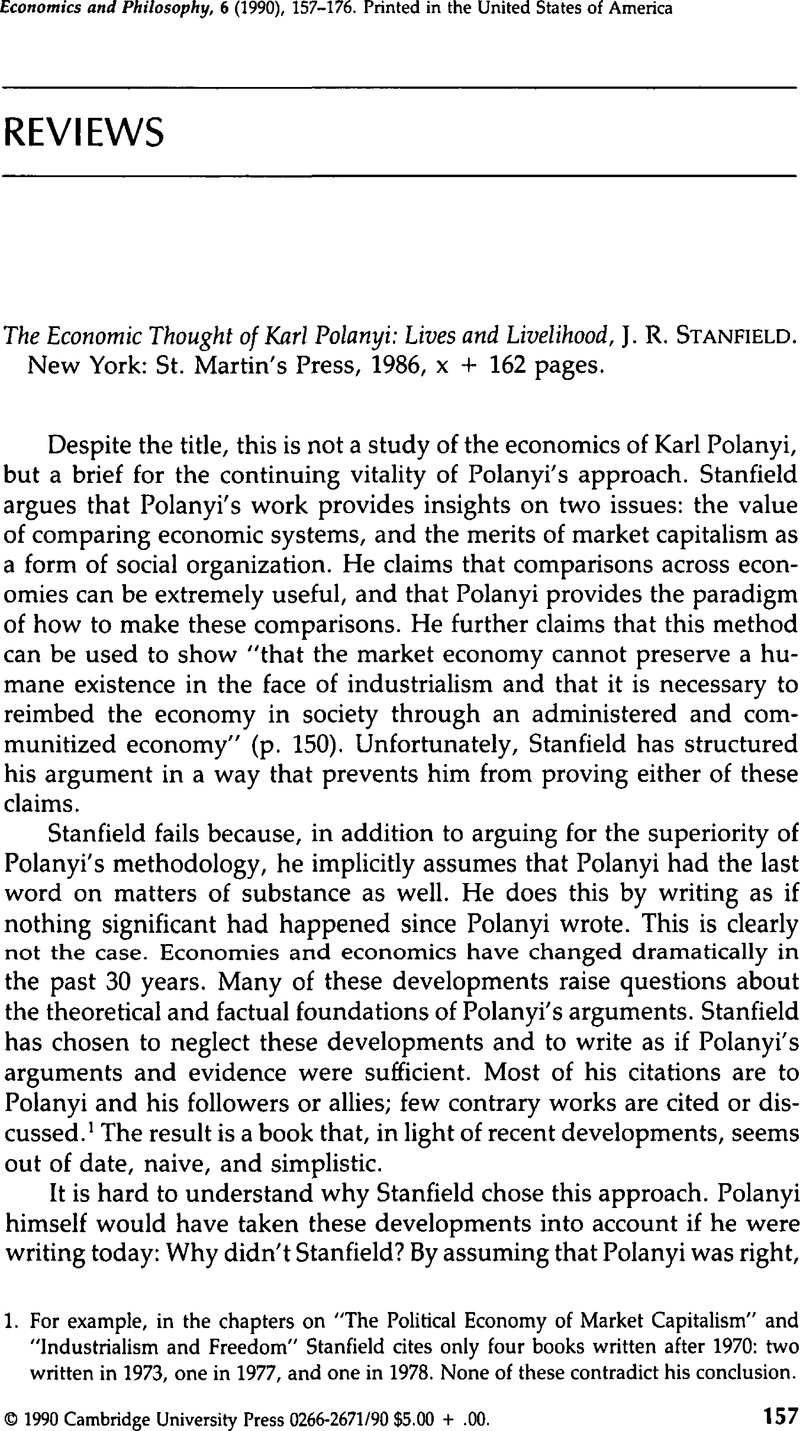No CrossRef data available.
Article contents
The Economic Thought of Karl Polanyi: Lives and Livelihood, J. R. Stanfield. New York: St. Martin's Press, 1986, x + 162 pages.
Published online by Cambridge University Press: 05 December 2008
Abstract
An abstract is not available for this content so a preview has been provided. Please use the Get access link above for information on how to access this content.

- Type
- Reviews
- Information
- Copyright
- Copyright © Cambridge University Press 1990
References
REFERENCES
Axelrod, Robert. 1986. “An Evolutionary Theory of Norms.” American Journal of Political Science 80:1093–1111.Google Scholar
Bates, Robert. 1981. States and Markets in Tropical Africa. Berkeley: University of California Press.Google Scholar
Bates, Robert (editor). 1988. Toward a Political Economy of Development. Berkeley: University of California Press.Google Scholar
Chubb, John, and Peterson, Paul. 1989. Can the Government Govern? Washington: The Brookings Institution.Google Scholar
Eavey, Cheryl, and Miller, Gary. 1989. “Constitutional Conflict in State and Nation.” In The Federalist Papers and the New Institutionalism, edited by Grofman, Bernie and Wittman, Donald, pp. 205–19. New York: Agathon Press.Google Scholar
Eggertson, Thrain. Forthcoming. Economic Behavior and Institutions: Principles of Neoinstitutional Economics. New York: Cambridge University Press.CrossRefGoogle Scholar
Friedman, Debra, and Hechter, Michael. 1988. “The Contribution of Rational Choice Theory to Macrosociological Research.” Sociological Theory 6:201–18.CrossRefGoogle Scholar
Goldberg, Victor (editor). 1989. Readings in the Economics of Contract Law. New York: Cambridge University Press.Google Scholar
Grofman, Bernie, and Wittman, Donald. 1989. The Federalist Papers and the New Institu-tionalism. New York: Agathon Press.Google Scholar
Hechter, Michael. Forthcoming. “On the Inadequacy of Game Theory for the Solution of Real World Collective Action Problems.” In The Limits of Rationality, edited by Levi, Margaret and Cook, Karen. Chicago: University of Chicago Press.Google Scholar
Hechter, Michael. 1983. “Karl Polanyi's Social Theory: A Critique.” In Microfoundations of Macrosociology, edited by Hecter, Michael, pp. 158–189. Philadelphia: Temple University Press.Google Scholar
Hechter, Michael. (editor). 1983. The Microfoundations of Macrosociology. Philadelphia: Temple University Press.Google Scholar
Hogarth, Robin, and Reder, Melvin (editors). 1987. Rational Choice: The Contrast Between Economics and Psychology. Chicago: University of Chicago Press.Google Scholar
Levi, Margaret, and Cook, Karen. Forthcoming. The Limits of Rationality. Chicago: University of Chicago Press.Google Scholar
Macfarlane, Alan. 1978. The Origins of English Individualism. Oxford: Basil Blackwell.Google Scholar
McCubbins, Mathew, and Sullivan, Terry (editors). 1987. Congress: Structure and Policy. New York: Cambridge University Press.Google Scholar
Milinski, Manfred. 1987. “TIT FOR TAT in Sticklebacks and the Evolution of Cooperation.” Nature 325:433–35.Google Scholar
Miller, Gary. Forthcoming. “Administrative Dilemmas: The Role of Political Leadership.” In The Limits of Rationality, edited by Levi, Margaret and Cook, Karen. Chicago: University of Chicago Press.Google Scholar
Moe, Terry. 1989. “The Politics of Bureaucratic Structure.” In Can the Government Govern?, edited by Chubb, John and Peterson, Paul, pp. 267–329. Washington: The Brookings Institution.Google Scholar
North, Douglass. Forthcoming. Institutions, Institutional Change and Economic Performance. New York: Cambridge University Press.CrossRefGoogle Scholar
North, Douglass. 1977. “Markets and Other Allocation Systems in History: The Challenge of Karl Polanyi.” Journal of European Economic History 6:703–16.Google Scholar
Riker, William. 1980. “Implications from the Disequilibrium of Majority Rule for the Study of Institutions.” American Political Science Review 74:432–46.CrossRefGoogle Scholar
Schofield, Norman. 1985. “Anarchy, Altruism and Cooperation.” Social Choice and Welfare 2:207–19.CrossRefGoogle Scholar
Taylor, Michael. 1987. The Possibility of Cooperation. New York: Cambridge University Press.Google Scholar
Weingast, Barry, and Marshall, William. 1988. “The Industrial Organization of Congress; or Why Legislatures, Like Firms, Are Not Organized as Markets.” Journal of Political Economy 96:132–63.CrossRefGoogle Scholar


